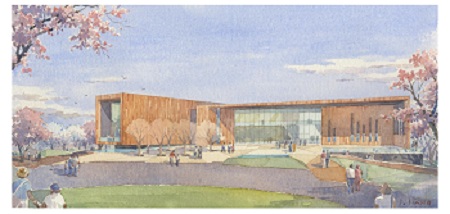 By M. ALEXIS SCOTT
By M. ALEXIS SCOTT
The National Center for Civil and Human Rights is set to break ground in October and is nearly three-quarters of the way toward its $100 million fund raising goal, including a new $1 million gift from the Arthur. Blank Foundation, officials announced Monday.
“The ground breakig will take place on Oct. 11, along with a series of events,” NCCHR CEO Doug Shipman said March 7 during a roundtable meeting with media in the board room of the Southern Company.
The capital campaign has raised more than $73 million, putting it in striking distance of its scaled down goal (from $120 million) to $100 million. Shipman estimated the center would open in the fall of 2013, a year later than originally planned.
Shipman also unveiled a modified design that he called more efficient, more accessible and less expensive to build.
The new design eliminates the interior courtyard and a seated auditorium, which Shipman said does not maximize the use of the interior space. It also gives it more gathering space outside its entrance, he said.
Center Board Chair and former Atlanta Mayor Shirley Franklin was also on hand for the announcement, saying she continues her support and commitment to the project.
Franklin joined Shipman and new Center appointees Deborah J. Richardson, who is executive vice president leading fundraising and program development, and Jill Savitt, exhibition coordinator.
Franklin said the Center is important to build on the city’s legacy of civil and human rights advocacy.
“it is intellectual engagement that cause action around democracy,” Franklin said. “The cener allows or cross cultural, cross generational and cross political thought that can advance human kind. . .. . The center is not starting this, we building on what was already going on in Atlanta.”
Richardson said the center will intensify its public fundraising activities with a three-pronged approach of “engaging, informing and inspiring” participation and support. A “Women’s Herstory” breakfast is planned for later this month, with several other special events later in the year.
She noted that the center will include a mix of permanent and topical exhibitions that will inspire the public. Part of the permanent exhibitions will be the King Papers purchased in 2006 and housed at Morehouse College. The center paid $11.5 million for the King Papers exhibition rights, helping to retire the $34 million loan that made the purchase possible.
“We are determined to raise the entire amount,” Frankling said which includes a $15 million endowment that will be used to help operate the center once it opens.
Franklin, Shipman and Richardson said they are confident that they can raise the funds, even in the current economic climate. “We’re in our third year of programming, fifth year of fundraising and third year of design,” Franklin said. “We are confident. We have come this far in spite of the recession. We’re not over confident because we know we need to broaden our reach.”
Richardson said she has prospects for $40 million that are being reviewed now, and the center is on track to meet its $100 million goal and open debt-free. The $1 million Arthur M. Blank Family Foundation gift joins other prominent philanthropic and corporate donors, including The Coca-Cola Company, Delta Air Lines, The Home Depot Foundation, Newell Rubbermaid, Turner Broadcasting System Inc. and The UPS Foundation.
The center will be built on the Pemberton Place property donated by The Coca-Cola Company downtown adjacent to Centennial Olympic Park, The New World of Coca-Cola and the Georgia Aquarium.
The fundraising goal to break ground is $85 million, Shipman said. While the public capital campaign launches this spring, it will be followed by a public annual fund campaign after groundbreaking.
Besides the King Papers, exhibitions will include Bennie Andrews John Lewis Collection and the the award-winning Without Sanctuary lynching exhibit. The center also will serve as a hub for ongoing dialogue, attracting world-renowned speakers and artists who work on a variety of human rights topics.
“The center can be a central change agent around the world,” Savitt said. “This is hallowed ground for the change we want to see in the rest of the world.”
For more information visit www.cchrpartnership.org.
